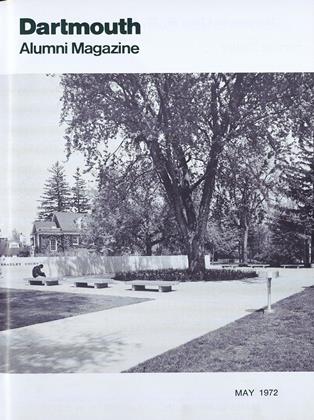Our Medex program for developing physician's assistants has had popular appeal since its inception and its first graduation ceremony, held last month in Kellogg Auditorium, was a warm, inspiring event. The weather cooperated—in fact, making it seem like a June day, compared to what we had been having—and our prime visitor from Washington, guest speaker Monte DuVal emanated enthusiasm as he addressed the young men who today are helping to provide health care in the rural sections of New Hampshire, Vermont, Maine and elsewhere in New England.
There was engaging speculation about Monte's class—or classes. And the College class of '44 emphatically wants it known that the handsome Washington official is one of their own. For those to whom World War II is something in history texts it should be explained that under an accelerated program Monte received his bachelor's degree in 1943 even though he had matriculated as a member of the class of '44. Therefore, for the record, the present Assistant Secretary of HEW (Health, Education and Welfare) for Health and Scientific Affairs is a member of the College class of 1944 and also the Dartmouth Medical School class of 1944. Monte has never wasted time.
For the record, let it also be noted that the Medex program's first graduates are now on duty on their first professional assignments, the members of the second class are now in training with their preceptors, and the success of the program is a real tribute to Dean Chapman and Dr. Nick Danforth DC '57, Medex Field Director, and his staff. DMS alumni attending the ceremony included MarshTenney M' 44 and Jim Strickler M'51.
Another development of major interest greatly expands the educational potential of the Department of Community Medicine. Dean J. Seibert, DMS Assistant Dean for Regional Medical Affairs, was notified by the FCC that licenses had been granted for closed-circuit, two-way television communication between the Medical Center in Hanover and the University of Vermont Medical Center in Burlington, with community hospitals across Vermont linked in. This interstate medical TV network, using the physical facilities operated by Vermont Educational Television, is a unique landmark in education. A $350,000 contract from the Lister Hill National Center for Biomedical Communications, a branch of the National Library of Medicine, Bethesda, Md., made it possible.
Still another development, though only begun, has popular preliminary acceptance that may presage national recognition. Peter Hauri, a native of Switzerland who previously taught psychiatry at the University of Virginia School of Medicine, has formed a sleep laboratory with the avowed purpose of finding specific cures for insomnia. Eventually, if his concepts can be carried out, people suffering from chronic insomnia will be able to spend several nights at the sleep lab, have their problems analyzed, and be cured. The lab is now functioning, with a limited number of patients and volunteer subjects accepted.
The following letter is from MikePassero M'67 at Duke University Medical Center:
"The Associated Schools news for March looked so sparse that I immediately began to write this to let you know some of the goings-on here in the Deep South:
"Alex and Barbara Latty M'65 recently left after four years here for the Service. We live two blocks from John and JeanReed M'68 and their two children. John is completing residency in internal medicine and plans to go on to a Cardiology Fellowship. Also living near Duke Medical are Intern Bill Kettyle M'69 and his wife CindyM'69 who is a Psychiatry Resident at the University of North Carolina Hospitals. My wife Mary Ann M'67 is busy in a Pediatric Pulmonary Disease and Allergy Fellowship. She has especially enjoyed working for Pediatric Department Chairman Sam KatzM'50. I am working in a Pulmonary Disease Fellowship here and am particularly excited about the project we're working on—it's a multi-disciplinary approach to alveolar responses to injury. Though we're based in a relatively heavily populated area (believe it or not, Durham has around 100,000 people!), we have almost daily contact with rural folk, and attempting to meet their medical needs has been one of our most rewarding experiences. That's all for now."
We're glad to receive a letter like that and hope to see more.
 View Full Issue
View Full Issue
More From This Issue
-
 Feature
FeatureA Valedictorian Changes His Mind
May 1972 By ALBERT WILLIAM LEVI '32 -
 Feature
FeatureMorton, Kilmarx Elected Charter Trustees
May 1972 -
 Feature
FeatureCharlie Zimmerman: An Appreciation
May 1972 By GEORGE H. COLTON -
 Feature
FeatureThe Nautical Nyes
May 1972 By MARY ROSS -
 Feature
FeatureAmerican Musicologist
May 1972 -
 Feature
FeatureTrade Unionist
May 1972
BLISS KIRBY THORNE '38
-
 Article
ArticleMedical School
DECEMBER 1971 By BLISS KIRBY THORNE '38 -
 Article
ArticleDoctor Turned Investigator
JANUARY 1972 By BLISS KIRBY THORNE '38 -
 Article
ArticleMedical School
JANUARY 1972 By BLISS KIRBY THORNE '38 -
 Article
ArticleMedical School
FEBRUARY 1972 By BLISS KIRBY THORNE '38 -
 Article
ArticleMedical School
NOVEMBER 1972 By BLISS KIRBY THORNE '38 -
 Feature
FeatureMedical Care via Television
APRIL 1973 By BLISS KIRBY THORNE '38








